Analyzing Alienation Theory in Social Work: A Critical Review
VerifiedAdded on 2020/10/04
|12
|3794
|95
Essay
AI Summary
This essay provides a critical analysis of alienation theory and its relevance to social work practice. It begins by defining alienation theory and its four key types: alienation from the product, the act of production, species-essence, and other workers. The essay then explores the economic, emotional, and psychological impacts of alienation, highlighting how these factors affect individuals and communities, particularly those experiencing poverty and mental health challenges. The economic impact is discussed in terms of economic powerlessness and inequality. The emotional impact considers attachment disorders and unfulfilled expectations. The psychological impact focuses on isolation and mental health problems. The essay further examines the implications of alienation theory for social workers working with people with mental disorders, emphasizing the importance of understanding the social and structural factors that contribute to their experiences. The role of social workers in prevention, treatment, and therapy is also examined. The essay concludes by emphasizing how alienation theory provides social workers with a framework for understanding inequality, social exclusion, and the need for empowerment and social change.
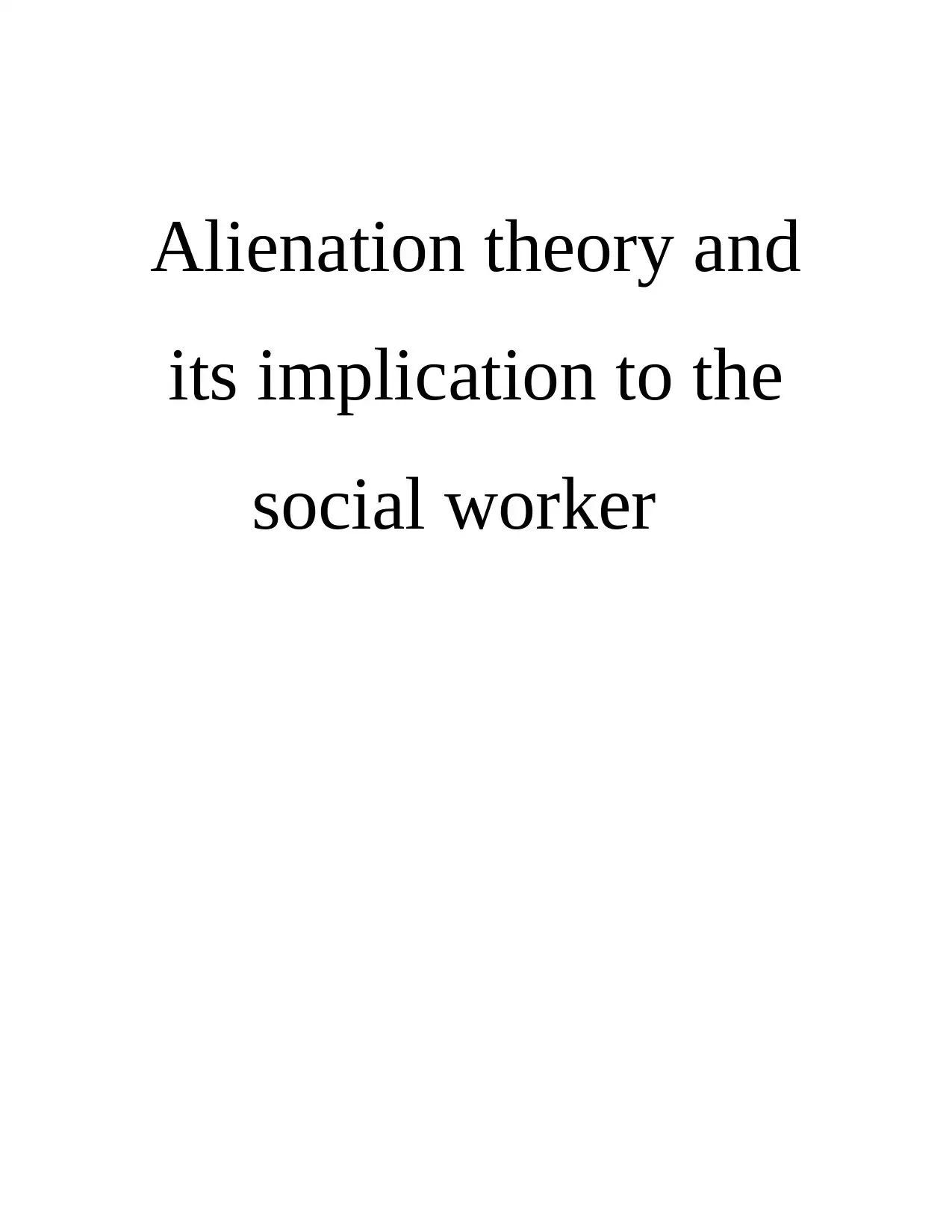
Alienation theory and
its implication to the
social worker
its implication to the
social worker
Paraphrase This Document
Need a fresh take? Get an instant paraphrase of this document with our AI Paraphraser
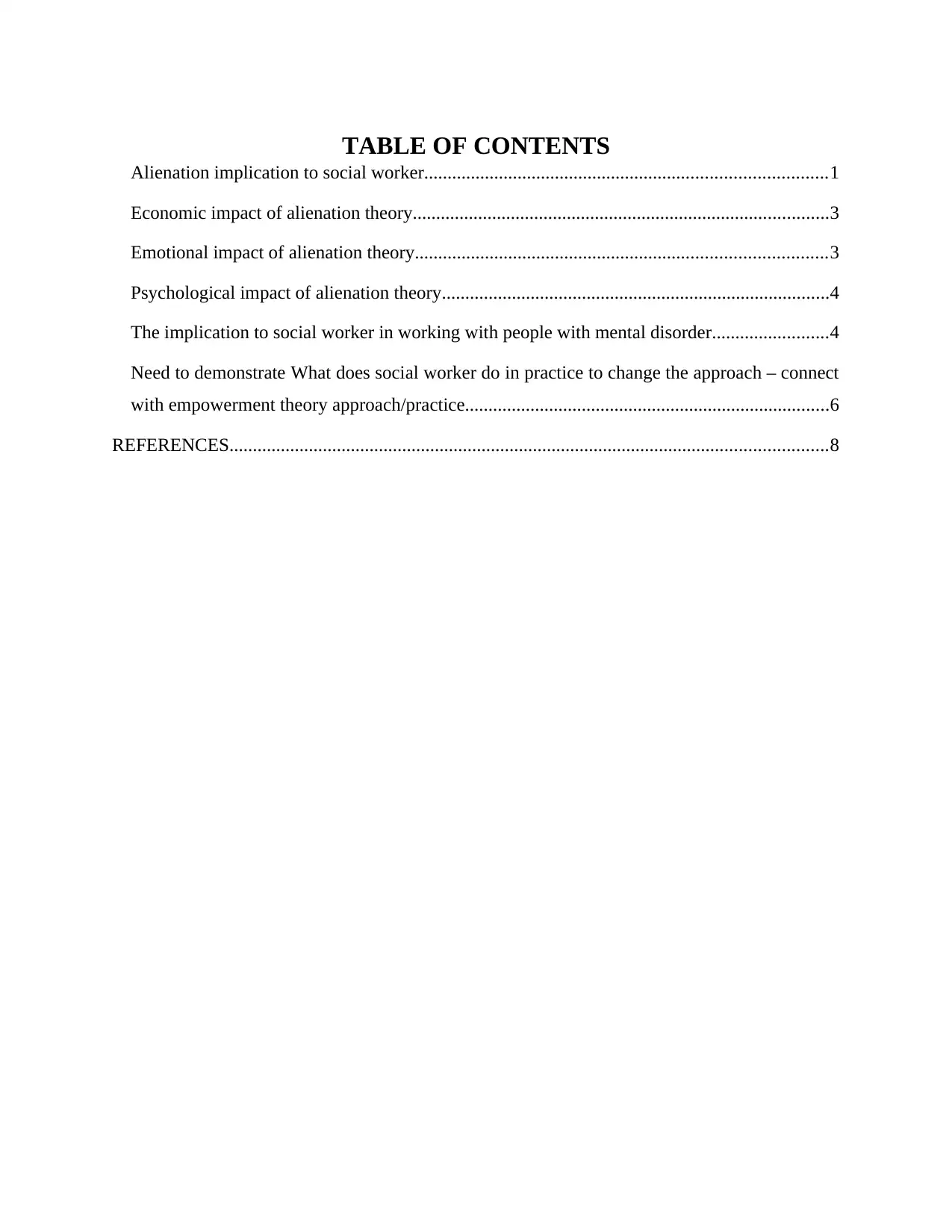
TABLE OF CONTENTS
Alienation implication to social worker......................................................................................1
Economic impact of alienation theory.........................................................................................3
Emotional impact of alienation theory........................................................................................3
Psychological impact of alienation theory...................................................................................4
The implication to social worker in working with people with mental disorder.........................4
Need to demonstrate What does social worker do in practice to change the approach – connect
with empowerment theory approach/practice..............................................................................6
REFERENCES................................................................................................................................8
Alienation implication to social worker......................................................................................1
Economic impact of alienation theory.........................................................................................3
Emotional impact of alienation theory........................................................................................3
Psychological impact of alienation theory...................................................................................4
The implication to social worker in working with people with mental disorder.........................4
Need to demonstrate What does social worker do in practice to change the approach – connect
with empowerment theory approach/practice..............................................................................6
REFERENCES................................................................................................................................8
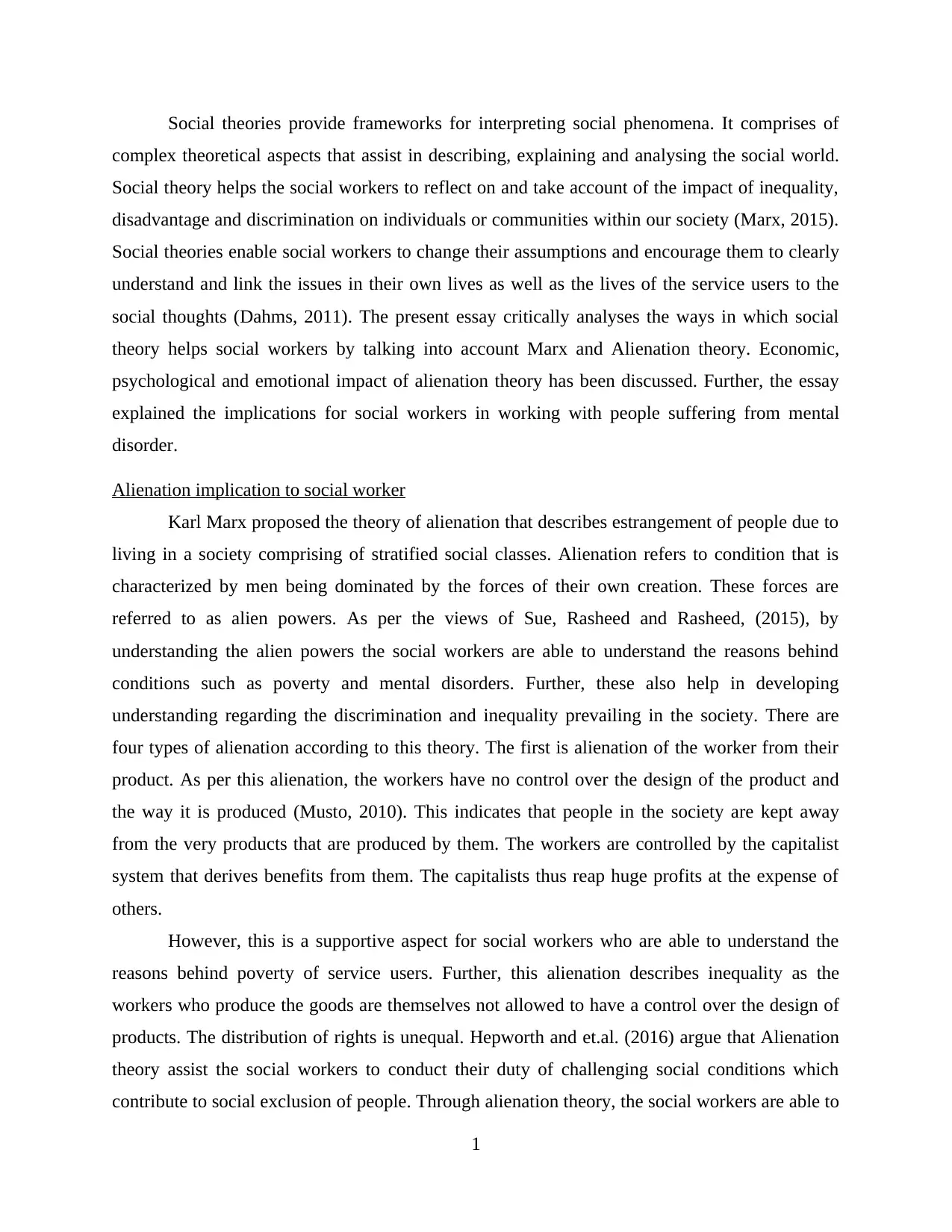
Social theories provide frameworks for interpreting social phenomena. It comprises of
complex theoretical aspects that assist in describing, explaining and analysing the social world.
Social theory helps the social workers to reflect on and take account of the impact of inequality,
disadvantage and discrimination on individuals or communities within our society (Marx, 2015).
Social theories enable social workers to change their assumptions and encourage them to clearly
understand and link the issues in their own lives as well as the lives of the service users to the
social thoughts (Dahms, 2011). The present essay critically analyses the ways in which social
theory helps social workers by talking into account Marx and Alienation theory. Economic,
psychological and emotional impact of alienation theory has been discussed. Further, the essay
explained the implications for social workers in working with people suffering from mental
disorder.
Alienation implication to social worker
Karl Marx proposed the theory of alienation that describes estrangement of people due to
living in a society comprising of stratified social classes. Alienation refers to condition that is
characterized by men being dominated by the forces of their own creation. These forces are
referred to as alien powers. As per the views of Sue, Rasheed and Rasheed, (2015), by
understanding the alien powers the social workers are able to understand the reasons behind
conditions such as poverty and mental disorders. Further, these also help in developing
understanding regarding the discrimination and inequality prevailing in the society. There are
four types of alienation according to this theory. The first is alienation of the worker from their
product. As per this alienation, the workers have no control over the design of the product and
the way it is produced (Musto, 2010). This indicates that people in the society are kept away
from the very products that are produced by them. The workers are controlled by the capitalist
system that derives benefits from them. The capitalists thus reap huge profits at the expense of
others.
However, this is a supportive aspect for social workers who are able to understand the
reasons behind poverty of service users. Further, this alienation describes inequality as the
workers who produce the goods are themselves not allowed to have a control over the design of
products. The distribution of rights is unequal. Hepworth and et.al. (2016) argue that Alienation
theory assist the social workers to conduct their duty of challenging social conditions which
contribute to social exclusion of people. Through alienation theory, the social workers are able to
1
complex theoretical aspects that assist in describing, explaining and analysing the social world.
Social theory helps the social workers to reflect on and take account of the impact of inequality,
disadvantage and discrimination on individuals or communities within our society (Marx, 2015).
Social theories enable social workers to change their assumptions and encourage them to clearly
understand and link the issues in their own lives as well as the lives of the service users to the
social thoughts (Dahms, 2011). The present essay critically analyses the ways in which social
theory helps social workers by talking into account Marx and Alienation theory. Economic,
psychological and emotional impact of alienation theory has been discussed. Further, the essay
explained the implications for social workers in working with people suffering from mental
disorder.
Alienation implication to social worker
Karl Marx proposed the theory of alienation that describes estrangement of people due to
living in a society comprising of stratified social classes. Alienation refers to condition that is
characterized by men being dominated by the forces of their own creation. These forces are
referred to as alien powers. As per the views of Sue, Rasheed and Rasheed, (2015), by
understanding the alien powers the social workers are able to understand the reasons behind
conditions such as poverty and mental disorders. Further, these also help in developing
understanding regarding the discrimination and inequality prevailing in the society. There are
four types of alienation according to this theory. The first is alienation of the worker from their
product. As per this alienation, the workers have no control over the design of the product and
the way it is produced (Musto, 2010). This indicates that people in the society are kept away
from the very products that are produced by them. The workers are controlled by the capitalist
system that derives benefits from them. The capitalists thus reap huge profits at the expense of
others.
However, this is a supportive aspect for social workers who are able to understand the
reasons behind poverty of service users. Further, this alienation describes inequality as the
workers who produce the goods are themselves not allowed to have a control over the design of
products. The distribution of rights is unequal. Hepworth and et.al. (2016) argue that Alienation
theory assist the social workers to conduct their duty of challenging social conditions which
contribute to social exclusion of people. Through alienation theory, the social workers are able to
1
⊘ This is a preview!⊘
Do you want full access?
Subscribe today to unlock all pages.

Trusted by 1+ million students worldwide
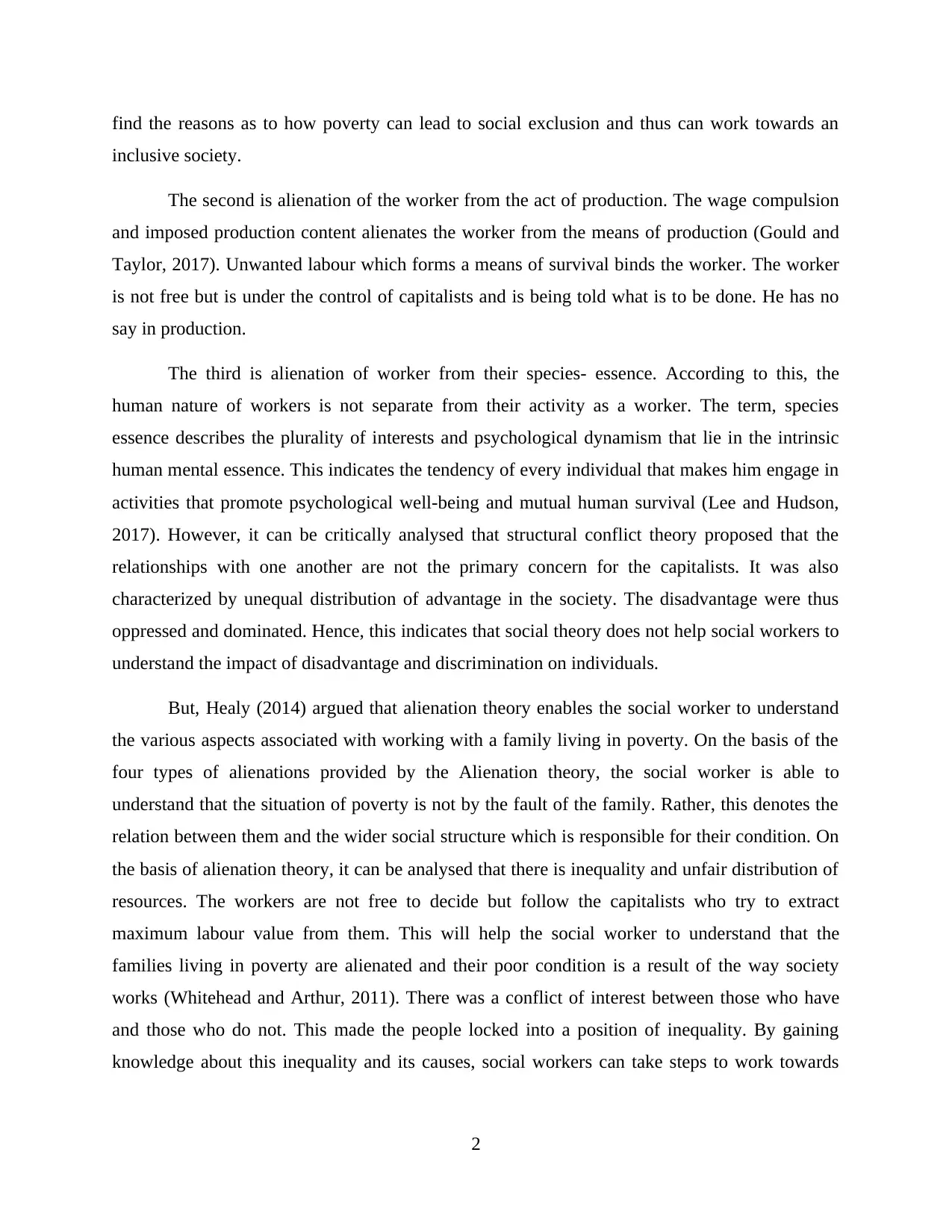
find the reasons as to how poverty can lead to social exclusion and thus can work towards an
inclusive society.
The second is alienation of the worker from the act of production. The wage compulsion
and imposed production content alienates the worker from the means of production (Gould and
Taylor, 2017). Unwanted labour which forms a means of survival binds the worker. The worker
is not free but is under the control of capitalists and is being told what is to be done. He has no
say in production.
The third is alienation of worker from their species- essence. According to this, the
human nature of workers is not separate from their activity as a worker. The term, species
essence describes the plurality of interests and psychological dynamism that lie in the intrinsic
human mental essence. This indicates the tendency of every individual that makes him engage in
activities that promote psychological well-being and mutual human survival (Lee and Hudson,
2017). However, it can be critically analysed that structural conflict theory proposed that the
relationships with one another are not the primary concern for the capitalists. It was also
characterized by unequal distribution of advantage in the society. The disadvantage were thus
oppressed and dominated. Hence, this indicates that social theory does not help social workers to
understand the impact of disadvantage and discrimination on individuals.
But, Healy (2014) argued that alienation theory enables the social worker to understand
the various aspects associated with working with a family living in poverty. On the basis of the
four types of alienations provided by the Alienation theory, the social worker is able to
understand that the situation of poverty is not by the fault of the family. Rather, this denotes the
relation between them and the wider social structure which is responsible for their condition. On
the basis of alienation theory, it can be analysed that there is inequality and unfair distribution of
resources. The workers are not free to decide but follow the capitalists who try to extract
maximum labour value from them. This will help the social worker to understand that the
families living in poverty are alienated and their poor condition is a result of the way society
works (Whitehead and Arthur, 2011). There was a conflict of interest between those who have
and those who do not. This made the people locked into a position of inequality. By gaining
knowledge about this inequality and its causes, social workers can take steps to work towards
2
inclusive society.
The second is alienation of the worker from the act of production. The wage compulsion
and imposed production content alienates the worker from the means of production (Gould and
Taylor, 2017). Unwanted labour which forms a means of survival binds the worker. The worker
is not free but is under the control of capitalists and is being told what is to be done. He has no
say in production.
The third is alienation of worker from their species- essence. According to this, the
human nature of workers is not separate from their activity as a worker. The term, species
essence describes the plurality of interests and psychological dynamism that lie in the intrinsic
human mental essence. This indicates the tendency of every individual that makes him engage in
activities that promote psychological well-being and mutual human survival (Lee and Hudson,
2017). However, it can be critically analysed that structural conflict theory proposed that the
relationships with one another are not the primary concern for the capitalists. It was also
characterized by unequal distribution of advantage in the society. The disadvantage were thus
oppressed and dominated. Hence, this indicates that social theory does not help social workers to
understand the impact of disadvantage and discrimination on individuals.
But, Healy (2014) argued that alienation theory enables the social worker to understand
the various aspects associated with working with a family living in poverty. On the basis of the
four types of alienations provided by the Alienation theory, the social worker is able to
understand that the situation of poverty is not by the fault of the family. Rather, this denotes the
relation between them and the wider social structure which is responsible for their condition. On
the basis of alienation theory, it can be analysed that there is inequality and unfair distribution of
resources. The workers are not free to decide but follow the capitalists who try to extract
maximum labour value from them. This will help the social worker to understand that the
families living in poverty are alienated and their poor condition is a result of the way society
works (Whitehead and Arthur, 2011). There was a conflict of interest between those who have
and those who do not. This made the people locked into a position of inequality. By gaining
knowledge about this inequality and its causes, social workers can take steps to work towards
2
Paraphrase This Document
Need a fresh take? Get an instant paraphrase of this document with our AI Paraphraser
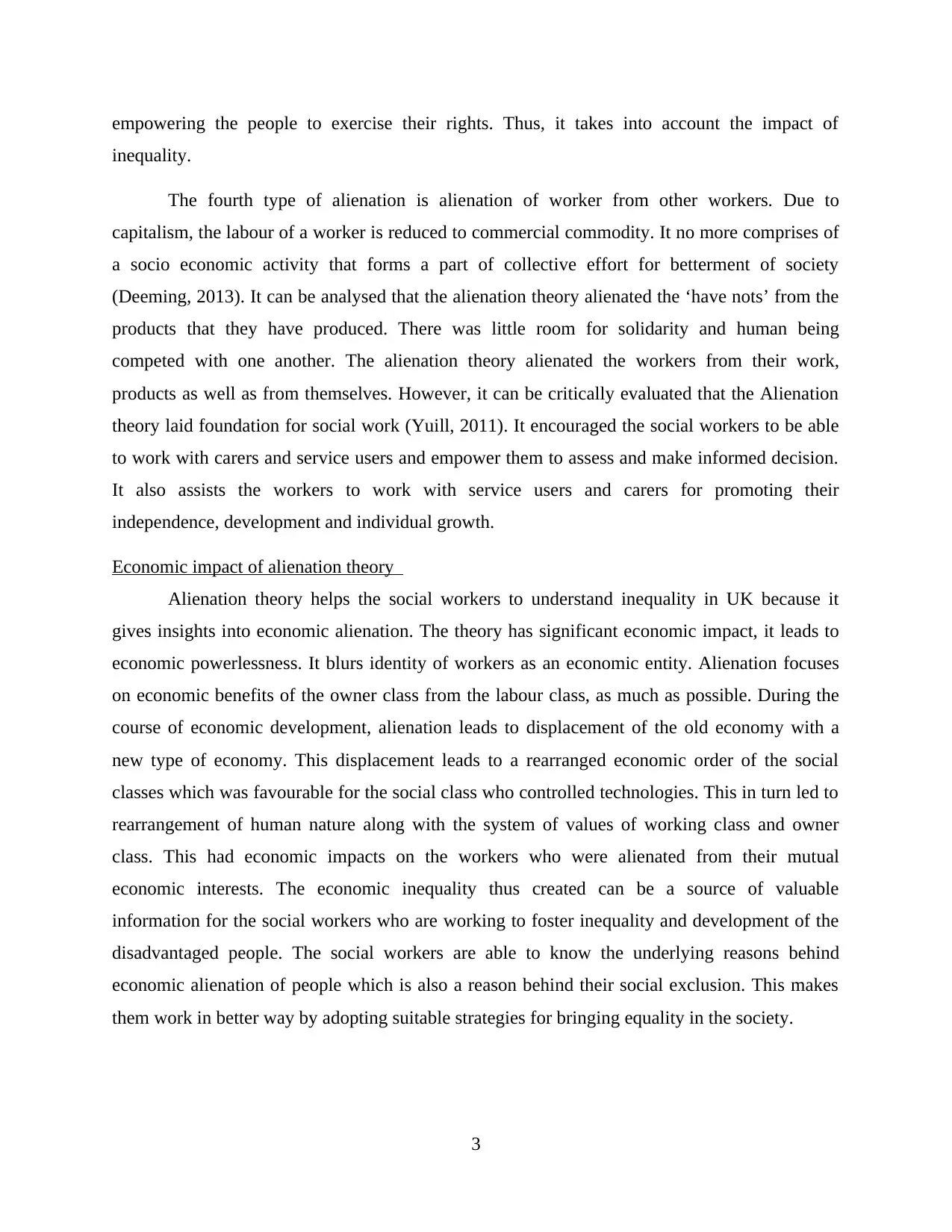
empowering the people to exercise their rights. Thus, it takes into account the impact of
inequality.
The fourth type of alienation is alienation of worker from other workers. Due to
capitalism, the labour of a worker is reduced to commercial commodity. It no more comprises of
a socio economic activity that forms a part of collective effort for betterment of society
(Deeming, 2013). It can be analysed that the alienation theory alienated the ‘have nots’ from the
products that they have produced. There was little room for solidarity and human being
competed with one another. The alienation theory alienated the workers from their work,
products as well as from themselves. However, it can be critically evaluated that the Alienation
theory laid foundation for social work (Yuill, 2011). It encouraged the social workers to be able
to work with carers and service users and empower them to assess and make informed decision.
It also assists the workers to work with service users and carers for promoting their
independence, development and individual growth.
Economic impact of alienation theory
Alienation theory helps the social workers to understand inequality in UK because it
gives insights into economic alienation. The theory has significant economic impact, it leads to
economic powerlessness. It blurs identity of workers as an economic entity. Alienation focuses
on economic benefits of the owner class from the labour class, as much as possible. During the
course of economic development, alienation leads to displacement of the old economy with a
new type of economy. This displacement leads to a rearranged economic order of the social
classes which was favourable for the social class who controlled technologies. This in turn led to
rearrangement of human nature along with the system of values of working class and owner
class. This had economic impacts on the workers who were alienated from their mutual
economic interests. The economic inequality thus created can be a source of valuable
information for the social workers who are working to foster inequality and development of the
disadvantaged people. The social workers are able to know the underlying reasons behind
economic alienation of people which is also a reason behind their social exclusion. This makes
them work in better way by adopting suitable strategies for bringing equality in the society.
3
inequality.
The fourth type of alienation is alienation of worker from other workers. Due to
capitalism, the labour of a worker is reduced to commercial commodity. It no more comprises of
a socio economic activity that forms a part of collective effort for betterment of society
(Deeming, 2013). It can be analysed that the alienation theory alienated the ‘have nots’ from the
products that they have produced. There was little room for solidarity and human being
competed with one another. The alienation theory alienated the workers from their work,
products as well as from themselves. However, it can be critically evaluated that the Alienation
theory laid foundation for social work (Yuill, 2011). It encouraged the social workers to be able
to work with carers and service users and empower them to assess and make informed decision.
It also assists the workers to work with service users and carers for promoting their
independence, development and individual growth.
Economic impact of alienation theory
Alienation theory helps the social workers to understand inequality in UK because it
gives insights into economic alienation. The theory has significant economic impact, it leads to
economic powerlessness. It blurs identity of workers as an economic entity. Alienation focuses
on economic benefits of the owner class from the labour class, as much as possible. During the
course of economic development, alienation leads to displacement of the old economy with a
new type of economy. This displacement leads to a rearranged economic order of the social
classes which was favourable for the social class who controlled technologies. This in turn led to
rearrangement of human nature along with the system of values of working class and owner
class. This had economic impacts on the workers who were alienated from their mutual
economic interests. The economic inequality thus created can be a source of valuable
information for the social workers who are working to foster inequality and development of the
disadvantaged people. The social workers are able to know the underlying reasons behind
economic alienation of people which is also a reason behind their social exclusion. This makes
them work in better way by adopting suitable strategies for bringing equality in the society.
3
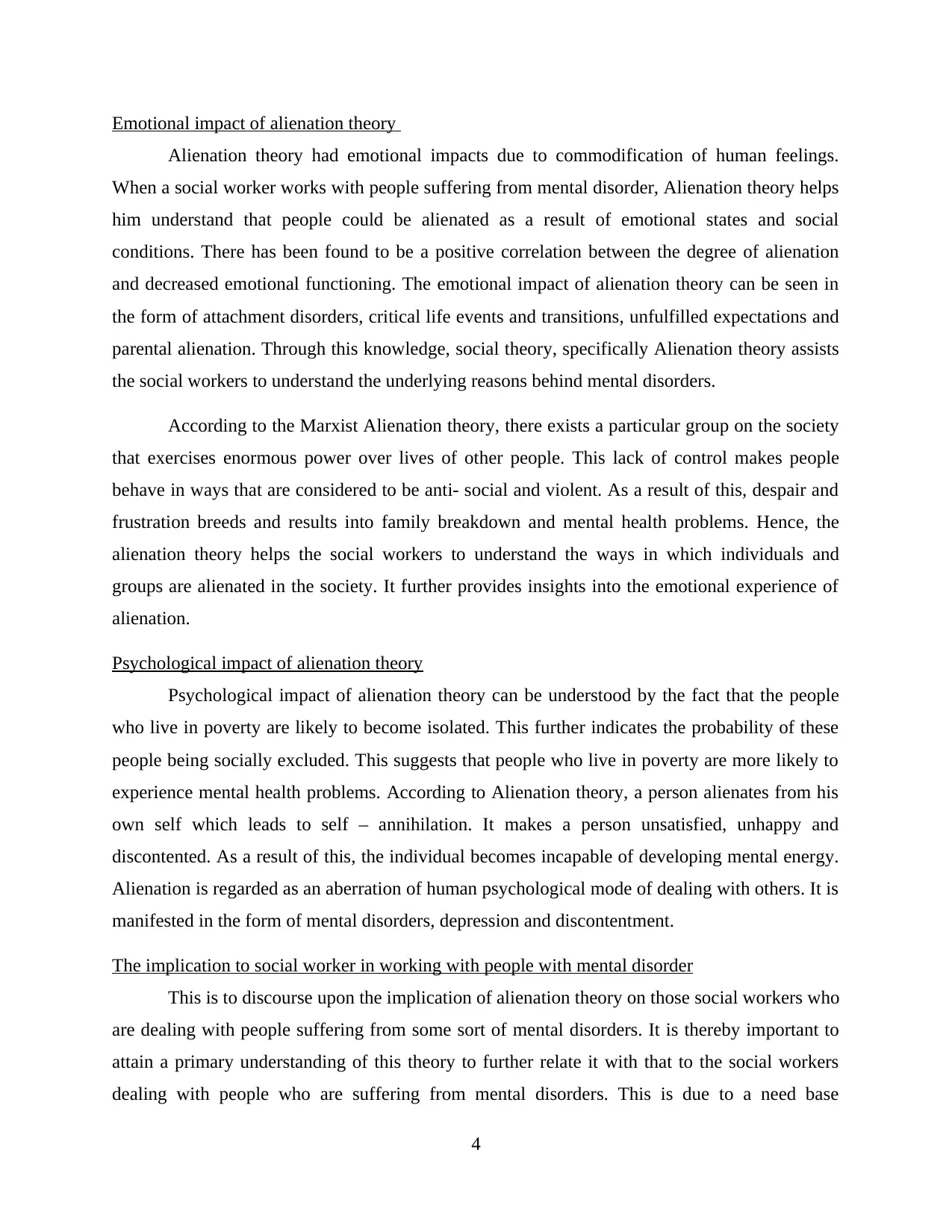
Emotional impact of alienation theory
Alienation theory had emotional impacts due to commodification of human feelings.
When a social worker works with people suffering from mental disorder, Alienation theory helps
him understand that people could be alienated as a result of emotional states and social
conditions. There has been found to be a positive correlation between the degree of alienation
and decreased emotional functioning. The emotional impact of alienation theory can be seen in
the form of attachment disorders, critical life events and transitions, unfulfilled expectations and
parental alienation. Through this knowledge, social theory, specifically Alienation theory assists
the social workers to understand the underlying reasons behind mental disorders.
According to the Marxist Alienation theory, there exists a particular group on the society
that exercises enormous power over lives of other people. This lack of control makes people
behave in ways that are considered to be anti- social and violent. As a result of this, despair and
frustration breeds and results into family breakdown and mental health problems. Hence, the
alienation theory helps the social workers to understand the ways in which individuals and
groups are alienated in the society. It further provides insights into the emotional experience of
alienation.
Psychological impact of alienation theory
Psychological impact of alienation theory can be understood by the fact that the people
who live in poverty are likely to become isolated. This further indicates the probability of these
people being socially excluded. This suggests that people who live in poverty are more likely to
experience mental health problems. According to Alienation theory, a person alienates from his
own self which leads to self – annihilation. It makes a person unsatisfied, unhappy and
discontented. As a result of this, the individual becomes incapable of developing mental energy.
Alienation is regarded as an aberration of human psychological mode of dealing with others. It is
manifested in the form of mental disorders, depression and discontentment.
The implication to social worker in working with people with mental disorder
This is to discourse upon the implication of alienation theory on those social workers who
are dealing with people suffering from some sort of mental disorders. It is thereby important to
attain a primary understanding of this theory to further relate it with that to the social workers
dealing with people who are suffering from mental disorders. This is due to a need base
4
Alienation theory had emotional impacts due to commodification of human feelings.
When a social worker works with people suffering from mental disorder, Alienation theory helps
him understand that people could be alienated as a result of emotional states and social
conditions. There has been found to be a positive correlation between the degree of alienation
and decreased emotional functioning. The emotional impact of alienation theory can be seen in
the form of attachment disorders, critical life events and transitions, unfulfilled expectations and
parental alienation. Through this knowledge, social theory, specifically Alienation theory assists
the social workers to understand the underlying reasons behind mental disorders.
According to the Marxist Alienation theory, there exists a particular group on the society
that exercises enormous power over lives of other people. This lack of control makes people
behave in ways that are considered to be anti- social and violent. As a result of this, despair and
frustration breeds and results into family breakdown and mental health problems. Hence, the
alienation theory helps the social workers to understand the ways in which individuals and
groups are alienated in the society. It further provides insights into the emotional experience of
alienation.
Psychological impact of alienation theory
Psychological impact of alienation theory can be understood by the fact that the people
who live in poverty are likely to become isolated. This further indicates the probability of these
people being socially excluded. This suggests that people who live in poverty are more likely to
experience mental health problems. According to Alienation theory, a person alienates from his
own self which leads to self – annihilation. It makes a person unsatisfied, unhappy and
discontented. As a result of this, the individual becomes incapable of developing mental energy.
Alienation is regarded as an aberration of human psychological mode of dealing with others. It is
manifested in the form of mental disorders, depression and discontentment.
The implication to social worker in working with people with mental disorder
This is to discourse upon the implication of alienation theory on those social workers who
are dealing with people suffering from some sort of mental disorders. It is thereby important to
attain a primary understanding of this theory to further relate it with that to the social workers
dealing with people who are suffering from mental disorders. This is due to a need base
4
⊘ This is a preview!⊘
Do you want full access?
Subscribe today to unlock all pages.

Trusted by 1+ million students worldwide
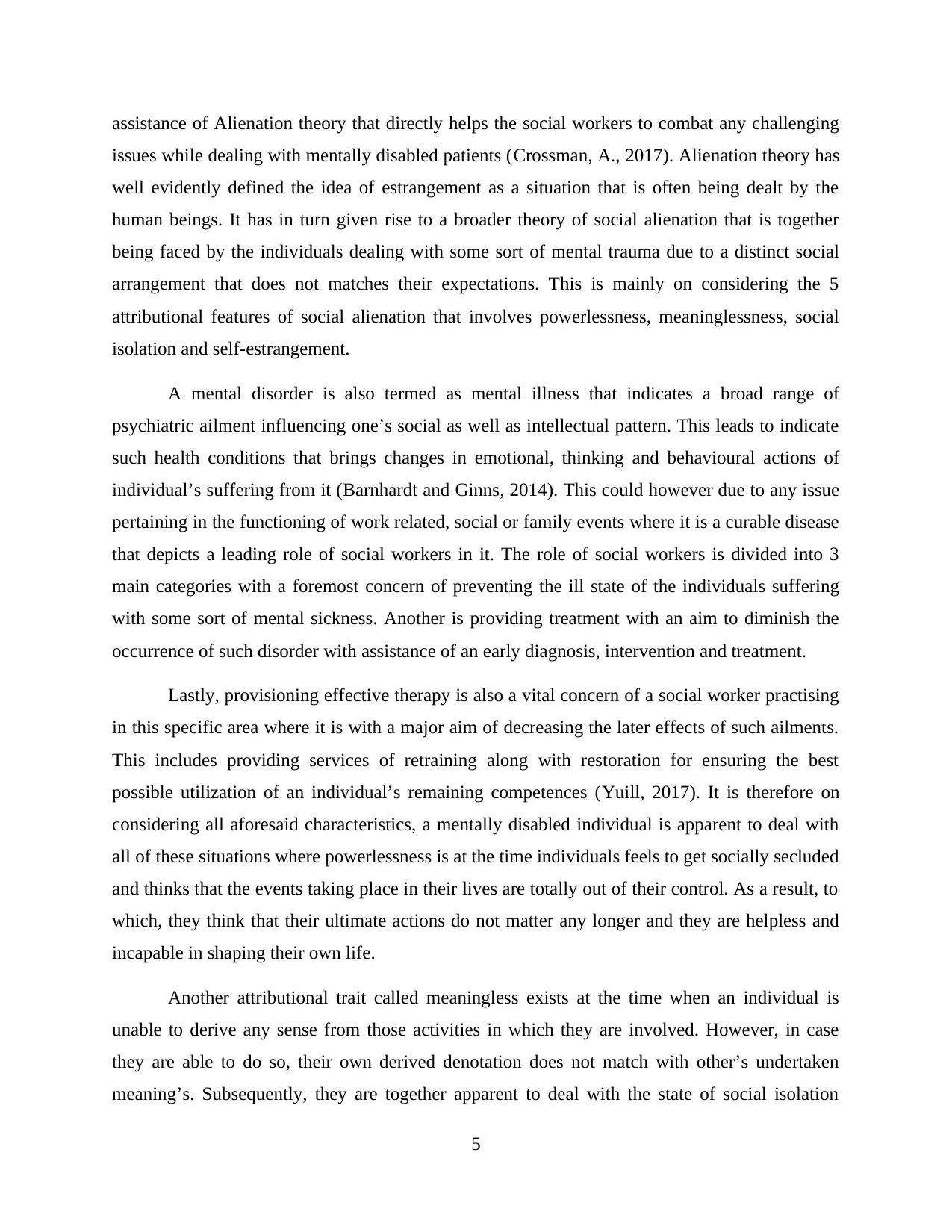
assistance of Alienation theory that directly helps the social workers to combat any challenging
issues while dealing with mentally disabled patients (Crossman, A., 2017). Alienation theory has
well evidently defined the idea of estrangement as a situation that is often being dealt by the
human beings. It has in turn given rise to a broader theory of social alienation that is together
being faced by the individuals dealing with some sort of mental trauma due to a distinct social
arrangement that does not matches their expectations. This is mainly on considering the 5
attributional features of social alienation that involves powerlessness, meaninglessness, social
isolation and self-estrangement.
A mental disorder is also termed as mental illness that indicates a broad range of
psychiatric ailment influencing one’s social as well as intellectual pattern. This leads to indicate
such health conditions that brings changes in emotional, thinking and behavioural actions of
individual’s suffering from it (Barnhardt and Ginns, 2014). This could however due to any issue
pertaining in the functioning of work related, social or family events where it is a curable disease
that depicts a leading role of social workers in it. The role of social workers is divided into 3
main categories with a foremost concern of preventing the ill state of the individuals suffering
with some sort of mental sickness. Another is providing treatment with an aim to diminish the
occurrence of such disorder with assistance of an early diagnosis, intervention and treatment.
Lastly, provisioning effective therapy is also a vital concern of a social worker practising
in this specific area where it is with a major aim of decreasing the later effects of such ailments.
This includes providing services of retraining along with restoration for ensuring the best
possible utilization of an individual’s remaining competences (Yuill, 2017). It is therefore on
considering all aforesaid characteristics, a mentally disabled individual is apparent to deal with
all of these situations where powerlessness is at the time individuals feels to get socially secluded
and thinks that the events taking place in their lives are totally out of their control. As a result, to
which, they think that their ultimate actions do not matter any longer and they are helpless and
incapable in shaping their own life.
Another attributional trait called meaningless exists at the time when an individual is
unable to derive any sense from those activities in which they are involved. However, in case
they are able to do so, their own derived denotation does not match with other’s undertaken
meaning’s. Subsequently, they are together apparent to deal with the state of social isolation
5
issues while dealing with mentally disabled patients (Crossman, A., 2017). Alienation theory has
well evidently defined the idea of estrangement as a situation that is often being dealt by the
human beings. It has in turn given rise to a broader theory of social alienation that is together
being faced by the individuals dealing with some sort of mental trauma due to a distinct social
arrangement that does not matches their expectations. This is mainly on considering the 5
attributional features of social alienation that involves powerlessness, meaninglessness, social
isolation and self-estrangement.
A mental disorder is also termed as mental illness that indicates a broad range of
psychiatric ailment influencing one’s social as well as intellectual pattern. This leads to indicate
such health conditions that brings changes in emotional, thinking and behavioural actions of
individual’s suffering from it (Barnhardt and Ginns, 2014). This could however due to any issue
pertaining in the functioning of work related, social or family events where it is a curable disease
that depicts a leading role of social workers in it. The role of social workers is divided into 3
main categories with a foremost concern of preventing the ill state of the individuals suffering
with some sort of mental sickness. Another is providing treatment with an aim to diminish the
occurrence of such disorder with assistance of an early diagnosis, intervention and treatment.
Lastly, provisioning effective therapy is also a vital concern of a social worker practising
in this specific area where it is with a major aim of decreasing the later effects of such ailments.
This includes providing services of retraining along with restoration for ensuring the best
possible utilization of an individual’s remaining competences (Yuill, 2017). It is therefore on
considering all aforesaid characteristics, a mentally disabled individual is apparent to deal with
all of these situations where powerlessness is at the time individuals feels to get socially secluded
and thinks that the events taking place in their lives are totally out of their control. As a result, to
which, they think that their ultimate actions do not matter any longer and they are helpless and
incapable in shaping their own life.
Another attributional trait called meaningless exists at the time when an individual is
unable to derive any sense from those activities in which they are involved. However, in case
they are able to do so, their own derived denotation does not match with other’s undertaken
meaning’s. Subsequently, they are together apparent to deal with the state of social isolation
5
Paraphrase This Document
Need a fresh take? Get an instant paraphrase of this document with our AI Paraphraser
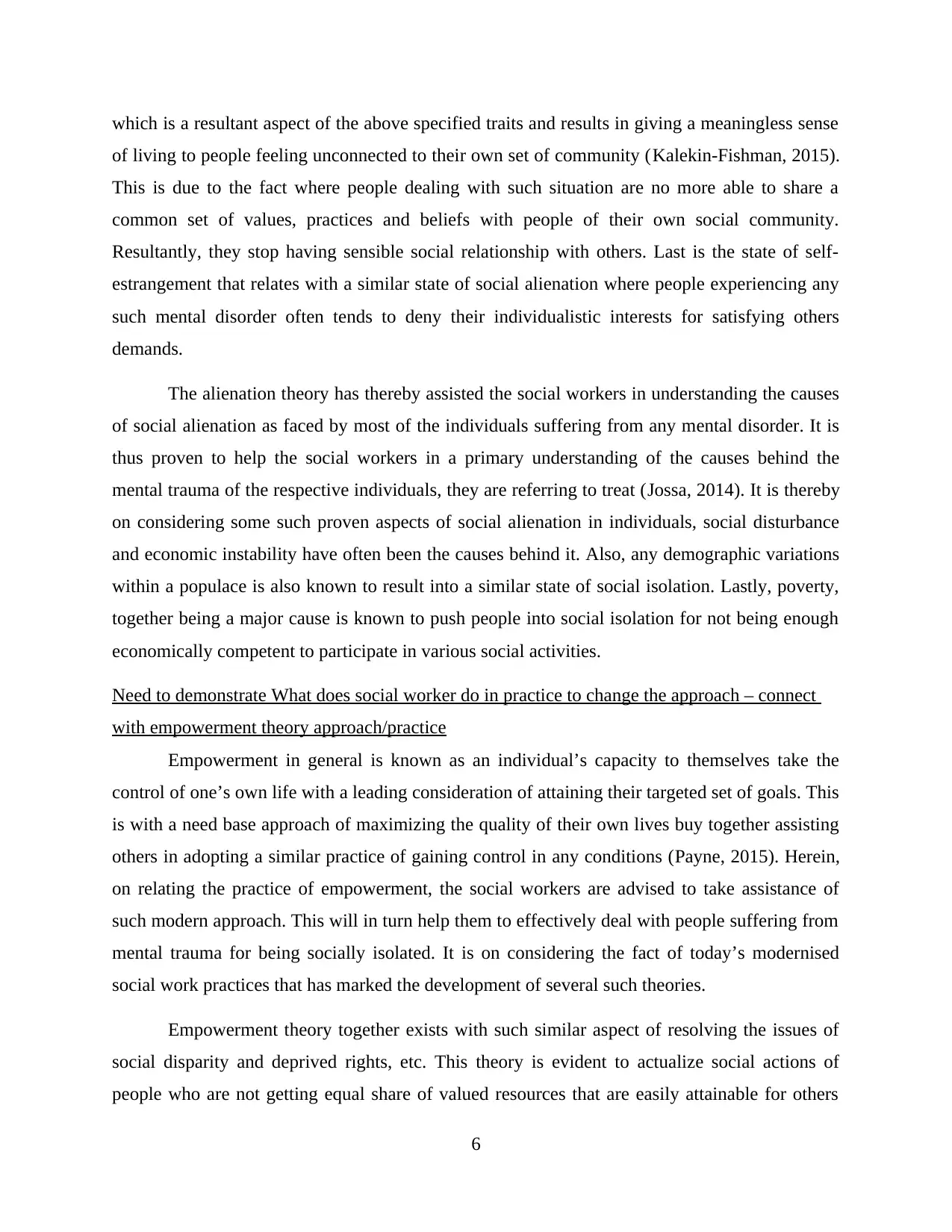
which is a resultant aspect of the above specified traits and results in giving a meaningless sense
of living to people feeling unconnected to their own set of community (Kalekin-Fishman, 2015).
This is due to the fact where people dealing with such situation are no more able to share a
common set of values, practices and beliefs with people of their own social community.
Resultantly, they stop having sensible social relationship with others. Last is the state of self-
estrangement that relates with a similar state of social alienation where people experiencing any
such mental disorder often tends to deny their individualistic interests for satisfying others
demands.
The alienation theory has thereby assisted the social workers in understanding the causes
of social alienation as faced by most of the individuals suffering from any mental disorder. It is
thus proven to help the social workers in a primary understanding of the causes behind the
mental trauma of the respective individuals, they are referring to treat (Jossa, 2014). It is thereby
on considering some such proven aspects of social alienation in individuals, social disturbance
and economic instability have often been the causes behind it. Also, any demographic variations
within a populace is also known to result into a similar state of social isolation. Lastly, poverty,
together being a major cause is known to push people into social isolation for not being enough
economically competent to participate in various social activities.
Need to demonstrate What does social worker do in practice to change the approach – connect
with empowerment theory approach/practice
Empowerment in general is known as an individual’s capacity to themselves take the
control of one’s own life with a leading consideration of attaining their targeted set of goals. This
is with a need base approach of maximizing the quality of their own lives buy together assisting
others in adopting a similar practice of gaining control in any conditions (Payne, 2015). Herein,
on relating the practice of empowerment, the social workers are advised to take assistance of
such modern approach. This will in turn help them to effectively deal with people suffering from
mental trauma for being socially isolated. It is on considering the fact of today’s modernised
social work practices that has marked the development of several such theories.
Empowerment theory together exists with such similar aspect of resolving the issues of
social disparity and deprived rights, etc. This theory is evident to actualize social actions of
people who are not getting equal share of valued resources that are easily attainable for others
6
of living to people feeling unconnected to their own set of community (Kalekin-Fishman, 2015).
This is due to the fact where people dealing with such situation are no more able to share a
common set of values, practices and beliefs with people of their own social community.
Resultantly, they stop having sensible social relationship with others. Last is the state of self-
estrangement that relates with a similar state of social alienation where people experiencing any
such mental disorder often tends to deny their individualistic interests for satisfying others
demands.
The alienation theory has thereby assisted the social workers in understanding the causes
of social alienation as faced by most of the individuals suffering from any mental disorder. It is
thus proven to help the social workers in a primary understanding of the causes behind the
mental trauma of the respective individuals, they are referring to treat (Jossa, 2014). It is thereby
on considering some such proven aspects of social alienation in individuals, social disturbance
and economic instability have often been the causes behind it. Also, any demographic variations
within a populace is also known to result into a similar state of social isolation. Lastly, poverty,
together being a major cause is known to push people into social isolation for not being enough
economically competent to participate in various social activities.
Need to demonstrate What does social worker do in practice to change the approach – connect
with empowerment theory approach/practice
Empowerment in general is known as an individual’s capacity to themselves take the
control of one’s own life with a leading consideration of attaining their targeted set of goals. This
is with a need base approach of maximizing the quality of their own lives buy together assisting
others in adopting a similar practice of gaining control in any conditions (Payne, 2015). Herein,
on relating the practice of empowerment, the social workers are advised to take assistance of
such modern approach. This will in turn help them to effectively deal with people suffering from
mental trauma for being socially isolated. It is on considering the fact of today’s modernised
social work practices that has marked the development of several such theories.
Empowerment theory together exists with such similar aspect of resolving the issues of
social disparity and deprived rights, etc. This theory is evident to actualize social actions of
people who are not getting equal share of valued resources that are easily attainable for others
6
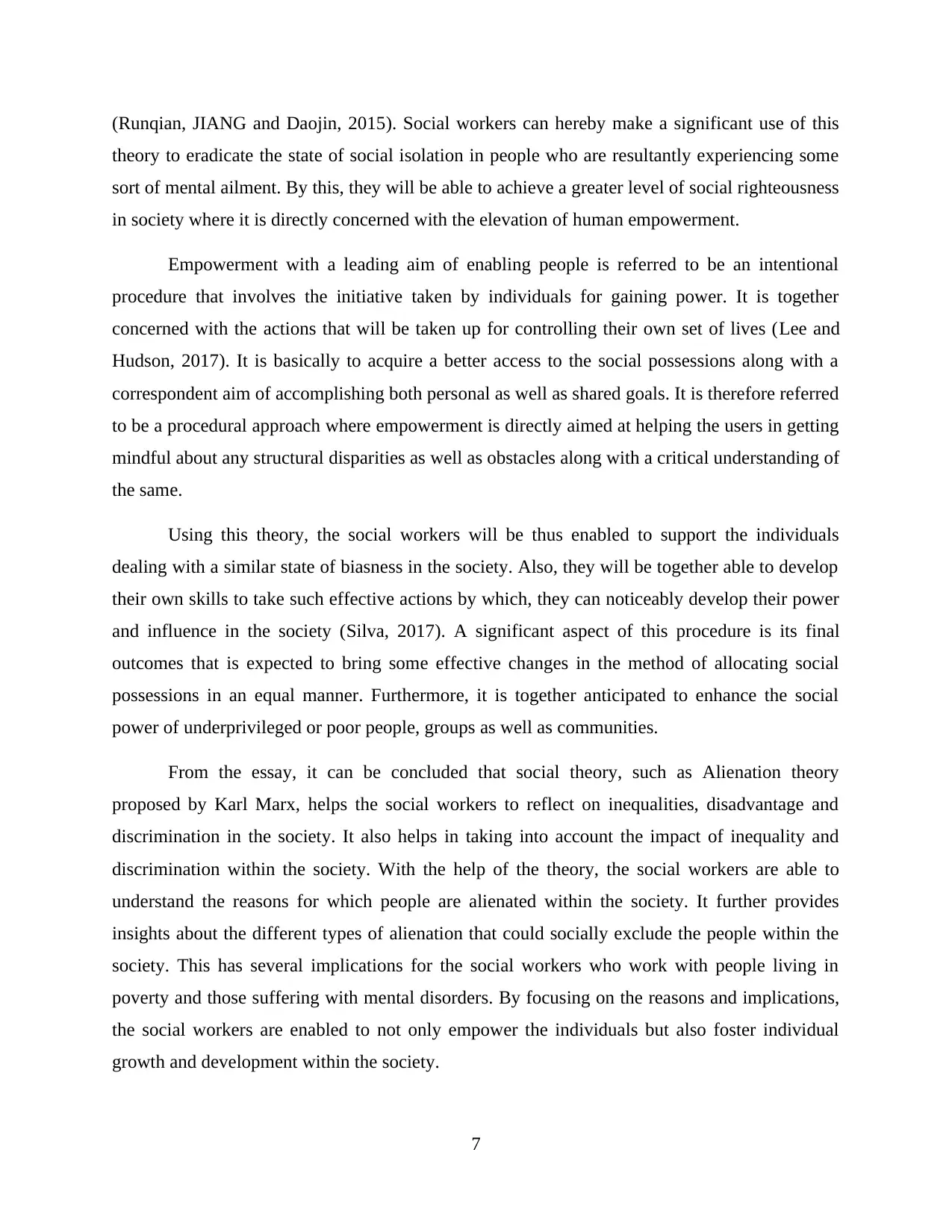
(Runqian, JIANG and Daojin, 2015). Social workers can hereby make a significant use of this
theory to eradicate the state of social isolation in people who are resultantly experiencing some
sort of mental ailment. By this, they will be able to achieve a greater level of social righteousness
in society where it is directly concerned with the elevation of human empowerment.
Empowerment with a leading aim of enabling people is referred to be an intentional
procedure that involves the initiative taken by individuals for gaining power. It is together
concerned with the actions that will be taken up for controlling their own set of lives (Lee and
Hudson, 2017). It is basically to acquire a better access to the social possessions along with a
correspondent aim of accomplishing both personal as well as shared goals. It is therefore referred
to be a procedural approach where empowerment is directly aimed at helping the users in getting
mindful about any structural disparities as well as obstacles along with a critical understanding of
the same.
Using this theory, the social workers will be thus enabled to support the individuals
dealing with a similar state of biasness in the society. Also, they will be together able to develop
their own skills to take such effective actions by which, they can noticeably develop their power
and influence in the society (Silva, 2017). A significant aspect of this procedure is its final
outcomes that is expected to bring some effective changes in the method of allocating social
possessions in an equal manner. Furthermore, it is together anticipated to enhance the social
power of underprivileged or poor people, groups as well as communities.
From the essay, it can be concluded that social theory, such as Alienation theory
proposed by Karl Marx, helps the social workers to reflect on inequalities, disadvantage and
discrimination in the society. It also helps in taking into account the impact of inequality and
discrimination within the society. With the help of the theory, the social workers are able to
understand the reasons for which people are alienated within the society. It further provides
insights about the different types of alienation that could socially exclude the people within the
society. This has several implications for the social workers who work with people living in
poverty and those suffering with mental disorders. By focusing on the reasons and implications,
the social workers are enabled to not only empower the individuals but also foster individual
growth and development within the society.
7
theory to eradicate the state of social isolation in people who are resultantly experiencing some
sort of mental ailment. By this, they will be able to achieve a greater level of social righteousness
in society where it is directly concerned with the elevation of human empowerment.
Empowerment with a leading aim of enabling people is referred to be an intentional
procedure that involves the initiative taken by individuals for gaining power. It is together
concerned with the actions that will be taken up for controlling their own set of lives (Lee and
Hudson, 2017). It is basically to acquire a better access to the social possessions along with a
correspondent aim of accomplishing both personal as well as shared goals. It is therefore referred
to be a procedural approach where empowerment is directly aimed at helping the users in getting
mindful about any structural disparities as well as obstacles along with a critical understanding of
the same.
Using this theory, the social workers will be thus enabled to support the individuals
dealing with a similar state of biasness in the society. Also, they will be together able to develop
their own skills to take such effective actions by which, they can noticeably develop their power
and influence in the society (Silva, 2017). A significant aspect of this procedure is its final
outcomes that is expected to bring some effective changes in the method of allocating social
possessions in an equal manner. Furthermore, it is together anticipated to enhance the social
power of underprivileged or poor people, groups as well as communities.
From the essay, it can be concluded that social theory, such as Alienation theory
proposed by Karl Marx, helps the social workers to reflect on inequalities, disadvantage and
discrimination in the society. It also helps in taking into account the impact of inequality and
discrimination within the society. With the help of the theory, the social workers are able to
understand the reasons for which people are alienated within the society. It further provides
insights about the different types of alienation that could socially exclude the people within the
society. This has several implications for the social workers who work with people living in
poverty and those suffering with mental disorders. By focusing on the reasons and implications,
the social workers are enabled to not only empower the individuals but also foster individual
growth and development within the society.
7
⊘ This is a preview!⊘
Do you want full access?
Subscribe today to unlock all pages.

Trusted by 1+ million students worldwide

8
Paraphrase This Document
Need a fresh take? Get an instant paraphrase of this document with our AI Paraphraser
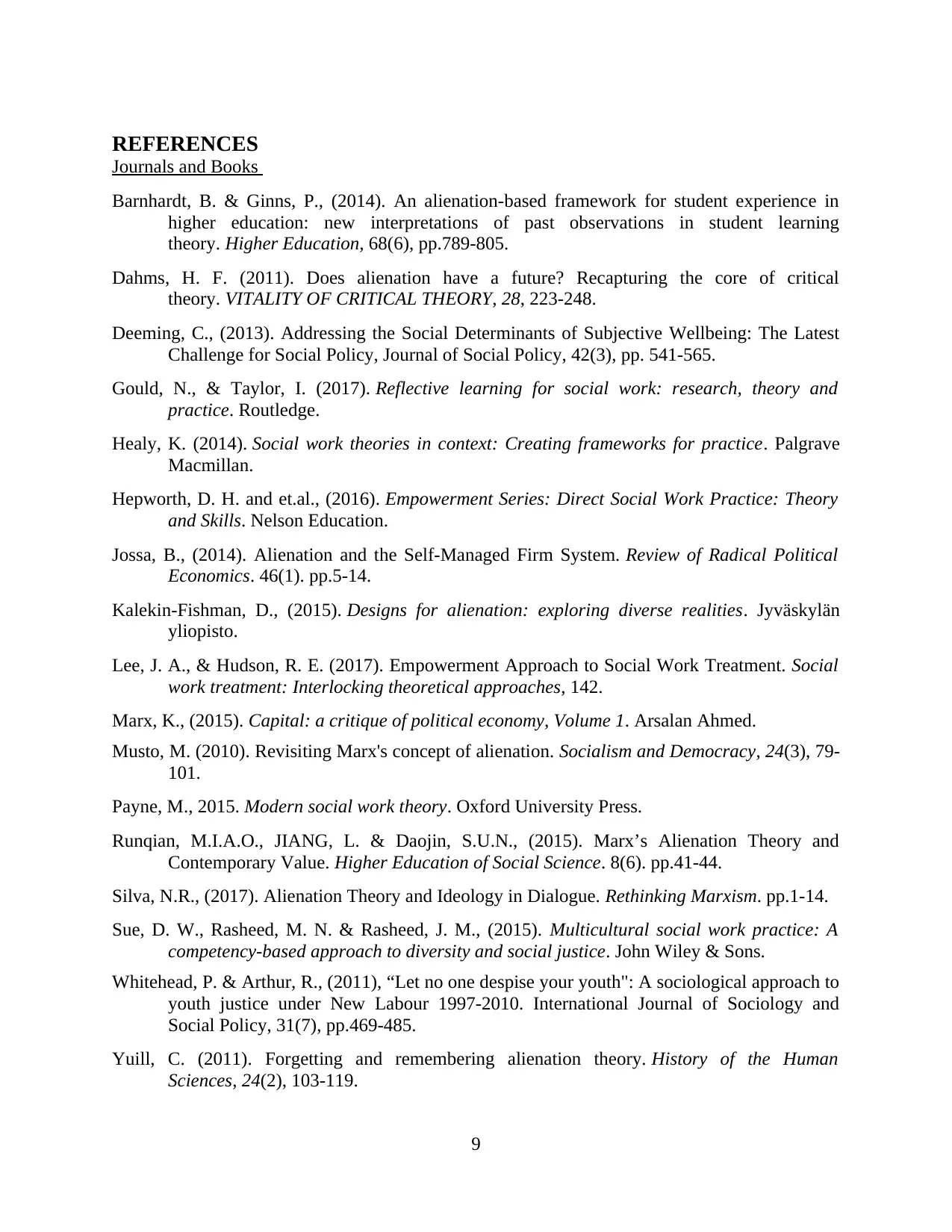
REFERENCES
Journals and Books
Barnhardt, B. & Ginns, P., (2014). An alienation-based framework for student experience in
higher education: new interpretations of past observations in student learning
theory. Higher Education, 68(6), pp.789-805.
Dahms, H. F. (2011). Does alienation have a future? Recapturing the core of critical
theory. VITALITY OF CRITICAL THEORY, 28, 223-248.
Deeming, C., (2013). Addressing the Social Determinants of Subjective Wellbeing: The Latest
Challenge for Social Policy, Journal of Social Policy, 42(3), pp. 541-565.
Gould, N., & Taylor, I. (2017). Reflective learning for social work: research, theory and
practice. Routledge.
Healy, K. (2014). Social work theories in context: Creating frameworks for practice. Palgrave
Macmillan.
Hepworth, D. H. and et.al., (2016). Empowerment Series: Direct Social Work Practice: Theory
and Skills. Nelson Education.
Jossa, B., (2014). Alienation and the Self-Managed Firm System. Review of Radical Political
Economics. 46(1). pp.5-14.
Kalekin-Fishman, D., (2015). Designs for alienation: exploring diverse realities. Jyväskylän
yliopisto.
Lee, J. A., & Hudson, R. E. (2017). Empowerment Approach to Social Work Treatment. Social
work treatment: Interlocking theoretical approaches, 142.
Marx, K., (2015). Capital: a critique of political economy, Volume 1. Arsalan Ahmed.
Musto, M. (2010). Revisiting Marx's concept of alienation. Socialism and Democracy, 24(3), 79-
101.
Payne, M., 2015. Modern social work theory. Oxford University Press.
Runqian, M.I.A.O., JIANG, L. & Daojin, S.U.N., (2015). Marx’s Alienation Theory and
Contemporary Value. Higher Education of Social Science. 8(6). pp.41-44.
Silva, N.R., (2017). Alienation Theory and Ideology in Dialogue. Rethinking Marxism. pp.1-14.
Sue, D. W., Rasheed, M. N. & Rasheed, J. M., (2015). Multicultural social work practice: A
competency-based approach to diversity and social justice. John Wiley & Sons.
Whitehead, P. & Arthur, R., (2011), “Let no one despise your youth": A sociological approach to
youth justice under New Labour 1997-2010. International Journal of Sociology and
Social Policy, 31(7), pp.469-485.
Yuill, C. (2011). Forgetting and remembering alienation theory. History of the Human
Sciences, 24(2), 103-119.
9
Journals and Books
Barnhardt, B. & Ginns, P., (2014). An alienation-based framework for student experience in
higher education: new interpretations of past observations in student learning
theory. Higher Education, 68(6), pp.789-805.
Dahms, H. F. (2011). Does alienation have a future? Recapturing the core of critical
theory. VITALITY OF CRITICAL THEORY, 28, 223-248.
Deeming, C., (2013). Addressing the Social Determinants of Subjective Wellbeing: The Latest
Challenge for Social Policy, Journal of Social Policy, 42(3), pp. 541-565.
Gould, N., & Taylor, I. (2017). Reflective learning for social work: research, theory and
practice. Routledge.
Healy, K. (2014). Social work theories in context: Creating frameworks for practice. Palgrave
Macmillan.
Hepworth, D. H. and et.al., (2016). Empowerment Series: Direct Social Work Practice: Theory
and Skills. Nelson Education.
Jossa, B., (2014). Alienation and the Self-Managed Firm System. Review of Radical Political
Economics. 46(1). pp.5-14.
Kalekin-Fishman, D., (2015). Designs for alienation: exploring diverse realities. Jyväskylän
yliopisto.
Lee, J. A., & Hudson, R. E. (2017). Empowerment Approach to Social Work Treatment. Social
work treatment: Interlocking theoretical approaches, 142.
Marx, K., (2015). Capital: a critique of political economy, Volume 1. Arsalan Ahmed.
Musto, M. (2010). Revisiting Marx's concept of alienation. Socialism and Democracy, 24(3), 79-
101.
Payne, M., 2015. Modern social work theory. Oxford University Press.
Runqian, M.I.A.O., JIANG, L. & Daojin, S.U.N., (2015). Marx’s Alienation Theory and
Contemporary Value. Higher Education of Social Science. 8(6). pp.41-44.
Silva, N.R., (2017). Alienation Theory and Ideology in Dialogue. Rethinking Marxism. pp.1-14.
Sue, D. W., Rasheed, M. N. & Rasheed, J. M., (2015). Multicultural social work practice: A
competency-based approach to diversity and social justice. John Wiley & Sons.
Whitehead, P. & Arthur, R., (2011), “Let no one despise your youth": A sociological approach to
youth justice under New Labour 1997-2010. International Journal of Sociology and
Social Policy, 31(7), pp.469-485.
Yuill, C. (2011). Forgetting and remembering alienation theory. History of the Human
Sciences, 24(2), 103-119.
9
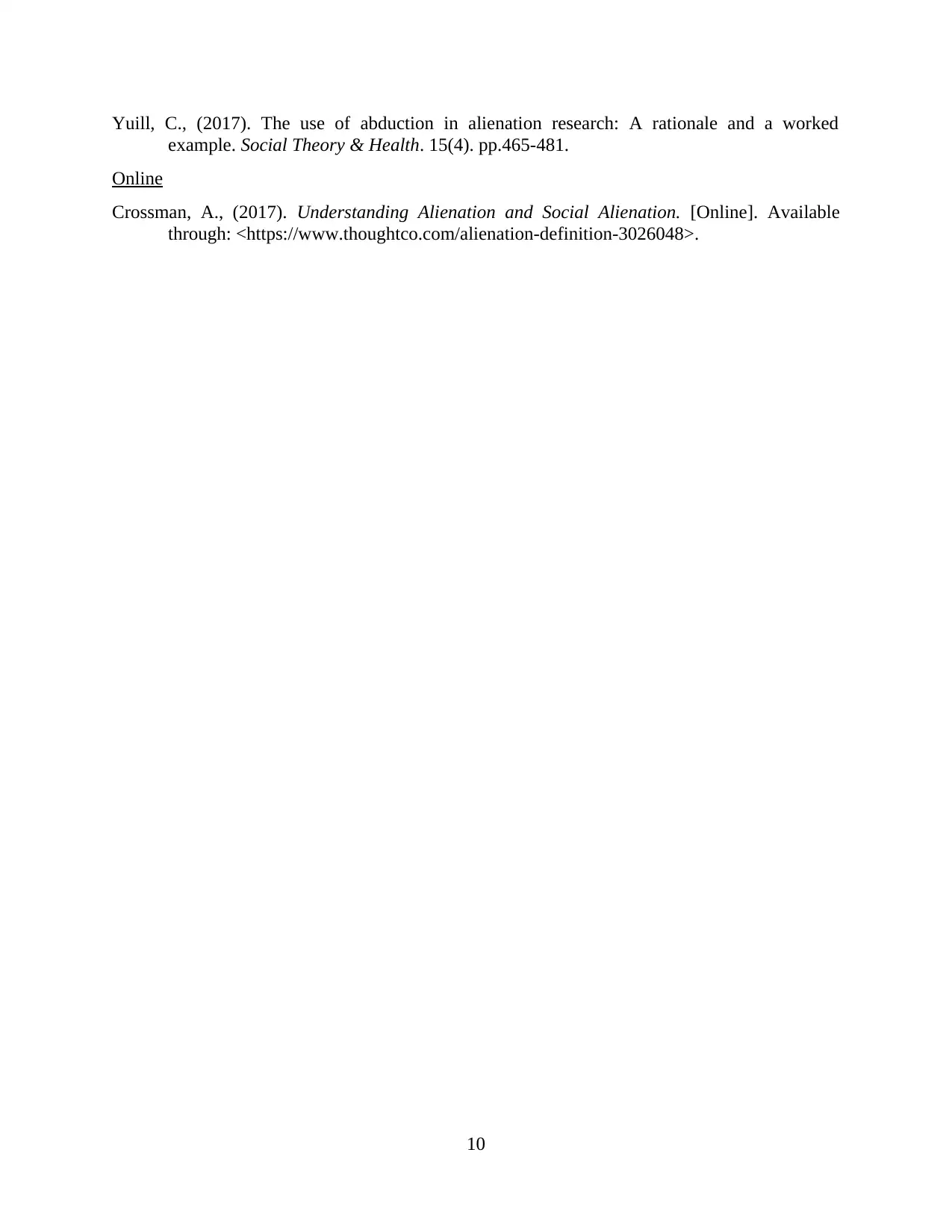
Yuill, C., (2017). The use of abduction in alienation research: A rationale and a worked
example. Social Theory & Health. 15(4). pp.465-481.
Online
Crossman, A., (2017). Understanding Alienation and Social Alienation. [Online]. Available
through: <https://www.thoughtco.com/alienation-definition-3026048>.
10
example. Social Theory & Health. 15(4). pp.465-481.
Online
Crossman, A., (2017). Understanding Alienation and Social Alienation. [Online]. Available
through: <https://www.thoughtco.com/alienation-definition-3026048>.
10
⊘ This is a preview!⊘
Do you want full access?
Subscribe today to unlock all pages.

Trusted by 1+ million students worldwide
1 out of 12
Related Documents
Your All-in-One AI-Powered Toolkit for Academic Success.
+13062052269
info@desklib.com
Available 24*7 on WhatsApp / Email
![[object Object]](/_next/static/media/star-bottom.7253800d.svg)
Unlock your academic potential
Copyright © 2020–2026 A2Z Services. All Rights Reserved. Developed and managed by ZUCOL.





